By David Lowery
(Part 3 of a 5 part series)
What follows is based on my notes and slides from my talk at SF Music Tech Summit. I realize that I’m about to alienate some of my friends that work on the tech side of the music business. These are good well intentioned people who genuinely want to help musicians succeed in the new digital paradigm. But if we are gonna come up with a system to compensate artists fairly in the new digital age we need an honest discussion of what is going on. The tech side of the music business really needs to look at how their actions and policies negatively impact artists, just as they have pointed out the negative effect record company actions have had on artists.
Too often the debate is about pirates vs the RIAA. This is ridiculous because the artists, the 99 percent of the music business are left out of the debate. I’m not advocating going back to the old record label model, to an industry dominated by the big 3 multi-national labels. This is a bit of hyperbole intended to make us all think about this question: Is the new digital distribution paradigm really better for the artist?
Meet The New Boss, Worse Than The Old Boss?
Part 3.
Slides 6 and 7.
If we’re gonna have a dialogue we need to be honest. Right? So Let’s be honest. The fact that many in the tech community keep saying “artists and record labels need to find a new model” is an admission that the current digital status quo doesn’t work. Right? Not for the artist anyway. As I’ll explain it actually makes a lot of money for a lot of companies.
I ran into Bob Weir at the SF Music Tech Summit. He asked what I’d spoke about. I briefly explained that I had a critique of the new digital model cause my data shows that little revenue is flowing to the artists. He replied “I know we got to make it so artists can make a living”. Now this is significant because I assume Bob was there with his longtime songwriting partner Electronic Frontier Foundation Co-Founder John Perry Barlow. Barlow was probably busy pounding the table downstairs shouting “Intellectual Property is not Property” as he is wont to do. Now I must point out that this is quite a radical position for any American to take. The very success of our nation has been built on IP. Silicon Valley is built on IP. Does Barlow give away his royalties from all those Grateful Dead songs he wrote? But I digress.
++++++++++++++++++++
First I need to point out that THERE IS a stable digital music distribution model. We are not still trying to invent it. It’s been here for at least 10 years and has been relatively stable for the last six. It has three legs:
File sharing/Cyber Lockers. MegaUpload, FirstLoad, Pirate Bay, Bittorrent etc etc
Streaming type services. Pandora, Spotify, YouTube, Grooveshark, etc.
Digital Music Stores. iTunes, Amazon Mp3, Rhapsody, Google Play etc
This digital distribution model is firmly entrenched with all of the “distributors” revenue models firmly in place and with the exception of streaming, solidly profitable.
File Sharing.
(Thanks to Ellen Seidler for enlightening me on much of this)
Unlicensed File-sharing sites make money off advertising and upgrades that allow faster downloads of unlicensed materials. As demonstrated in the video “Pop up Pirates” Google and other web advertising companies make money placing ads on these sites as well as making money from people searching for things like “download we are young fun.” Let me quickly demonstrate.
Now note the first two sites are unlicensed. The artist’s own site is #3. iTunes is #4. There is lot’s of data on how important it is to be the the first or second link in search results. This is when the the Digerati suddenly become ignorant of consumer behavior on the web.
“Nah….you really think unlicensed file sharing has any effect on legal sales?”
Let’s click on the Mp3skull link.
As you can see Mp3skull.com is making money from that Hertz ad. I’m sure it’s not much per view but considering this is the #1 song in the country I’m sure it adds up. And the web advertising company that placed it there is also making money (google?). These are not small companies. And some of these file sharing companies are making big money. Kim Dotcom and MegaUpload anyone?
Now an artist or record label can request that google take these links down. You file a DMCA takedown notice. I sometimes do this. Usually only if an advance copy has leaked and my album is not commercially available yet. But look what happens when you file a DMCA takedown notice with google.
First redo search this time for a 50 Cent track.
Scroll down a bit and you will find that google has included these strange notices.
In response to a complaint we received under the US Digital Millennium Copyright Act, we have removed 1 result(s) from this page. If you wish you may read the DMCA complaint that caused the removal(s) at ChillingEffects.org
Google removes the links. It’s required to do this by law. But the next part is not required by law.
Google has chosen to proclaim it has removed this link, and it provides you with a link to the complaint on the (ironically named) Chillingeffects.org. But if you click on “read the DMCA complaint” you are taken to www.chillingeffects.org where you get to see the actual complaint. But more importantly you get to see the offending links. The unlicensed download link you wanted is just one extra click away.
Copy and paste the link into your browser and you can download the file. So really nothing has been accomplished. I can’t imagine I’m the first one to discover this.
(I can’t find a DMCA agent for Chillingeffects.org. If they happen to not have one aren’t they liable for posting these links under DMCA? anybody?)
This is why Google is the giant of the “Innovation Industry” here is one of the most beautifully executed legal kludges I’ve ever seen. Google date rapes the spirit of the law while keeping to the letter.
The new boss thinks we’re stupid.
Apparently they are partially right because Stanford, UC Berkeley, Harvard, University of San Francisco, George Washington School of Law, Santa Clara University of Law and (inexplicably) The University of Maine are all listed as sponsors of this website.
This is from the home page of www.chillingeffects.org
Monitoring the legal climate for internet activity.
A joint project of the Electronic Frontier Foundation and Harvard, Stanford, Berkeley, University of San Francisco, University of Maine, George Washington School of Law, and Santa Clara University School of Law clinics.
There is a bunch of mumbo jumbo on this site about how it’s supposed to help individuals navigate through the DMCA legal thicket. They claim the idea is to combat the Chilling Effects of DMCA on free speech. This is all fine and dandy if the typical individual needing help was some poor innocent teenager who didn’t know it was not legal to share long clips of Hugo on her movie review blog.
But dig into the site. Almost all the activity is Twitter or Google publishing the DMCA takedown notices they receive. Because you must list your legal name and address on these DMCA notices I believe these are published to specifically intimidate those who ask for links to be removed. I mean I certainly think twice before I file one of these notices with Google specifically because there is a good chance Google will put me this on this site.
Good job university eggheads! Congrats on making it easier for the rich, powerful and unaccountable to intimidate the little guy!
If anyone reading this is an alumni of one of these fine institutions I suggest you do as I did and write the President or Dean and ask if they are aware that Google is using them as a fig leaf for a dubious legal workaround? Further the site is actually working to chill free speech.
File-sharing: So how much does this part of the digital ecosystem share with artists?
ZERO. NADA. ZILCH.
Old Boss: pays the artist too little.
New Boss: pays the artist nothing.
So this part of the new digital ecosystem is clearly worse than the old system. Plus at least one player profiting from this system seems to be trying to intimidate the artists into not exercising their rights.
Streaming
When I refer to streaming I include not only Spotify, Pandora and other similar services. I also include YouTube. Virtually every song i’ve ever written is streamable on YouTube. Even if it’s just a static shot of the cover and the audio uploaded by some well meaning fan.
Pandora pays the artists according to statutory rates. Personally I’m happy that Spotify is attempting to pay artists, even if it’s not really enough yet. YouTube wouldn’t pay anything if it didn’t have to. So they don’t get my thanks. And Grooveshark pays nothing to artist.
First thing you need to know about streaming? Aside from Pandora there is a huge dispute about how much any of these services pay. And unfortunately I won’t be able to clear it up much.
I have friends, artists and record label execs who swear they or their artists are receiving about .3 to .6 cents a spin from Spotify (a rate some regard as “sustainable”and equitable). Others swear that’s not true, more like hundredths or thousandths of a penny.
I’ve looked at royalty statements from various artists. Both groups appear to be right!
I’ll just add my voice to the call for transparency in Spotify and all streaming licensing. It’s never good when there is no transparency. It inevitably part of some scheme to take advantage of someone somewhere. Usually the artist. Or to quote P.J. O’Rourke “Complexity IS fraud”.
Regardless in the last few months a lot of artists have come out with their personal stories on how their revenues from streaming are quite small. Here is a typical story from Benji Rogers who also runs Pledge Music.
http://www.pledgemusic.com/blog/52-so-wheres-it-all-going-digital-sales-for-the-independent-musician
The Black Keys really don’t like spotify.
So clearly a lot of artists feel they aren’t being adequately compensated.
When pressed on this Spotify seem’s to point the finger at the record labels. And the record labels point back at Spotify. And curiously UMG seems to defend Spotify more than the other labels. No one knows what deal UMG cut with Spotify but clearly they have some sort of stake in Spotify. How this effects revenue flowing to artists is unknown. UMG needs to clarify.
So for now let’s just say artists share of revenue from spotify and other streaming services is:
Unknown and subject to possibly shady deals.
Sounds just like the old boss right?
++++++++++++++++++++++++++++++++++++++++++++
Tomorrow in part four I will discuss the “white hats” in the digital music ecosystem. The stores like iTunes, Amazon Mp3 store eMusic etc.
Read Part 1
Read Part 2

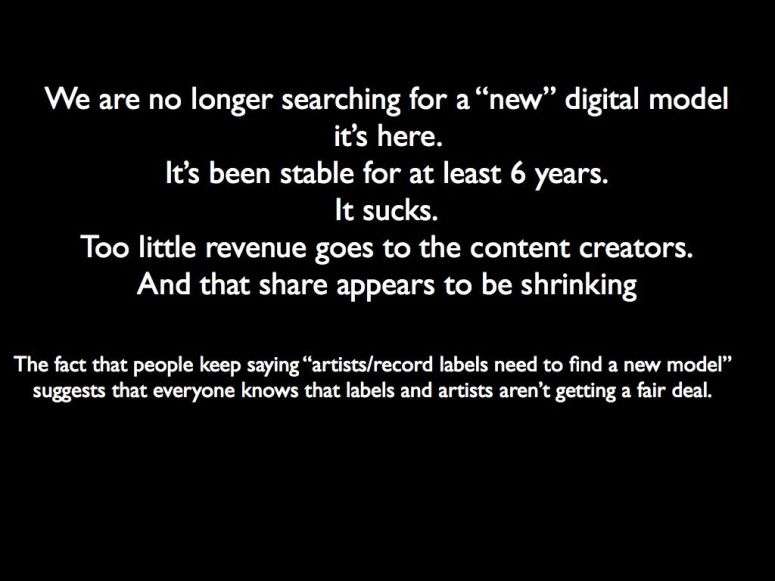

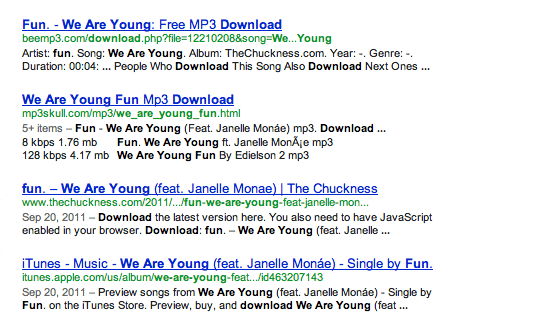
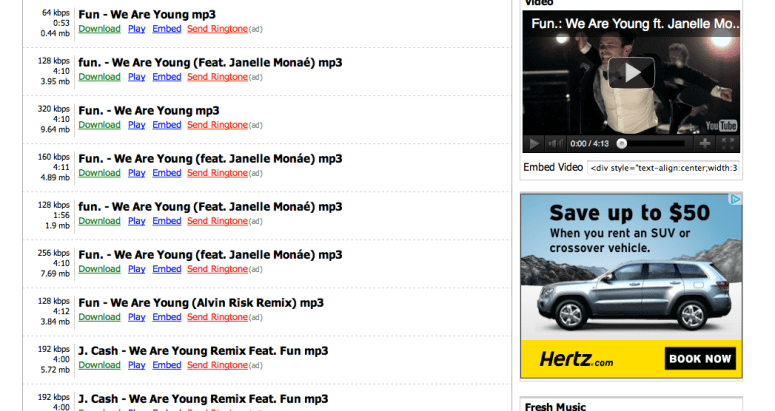
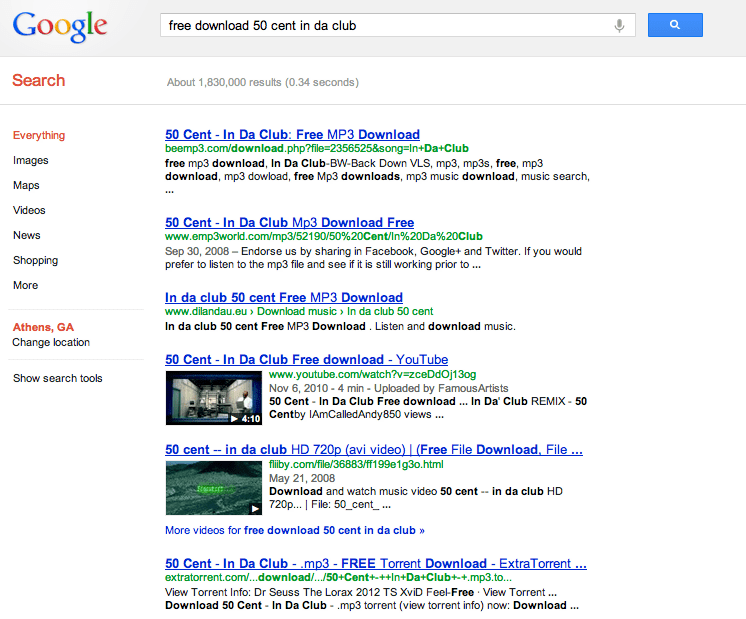
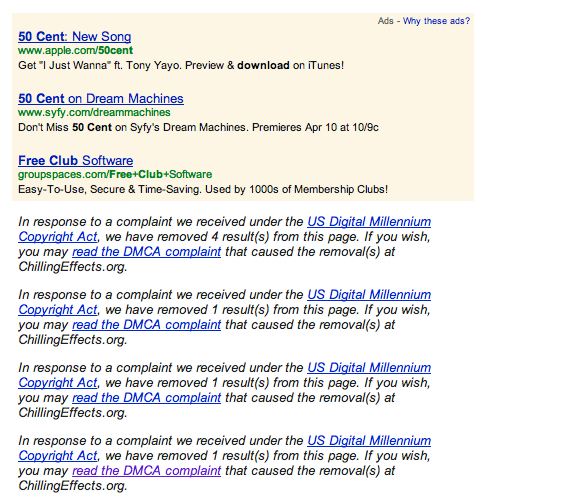
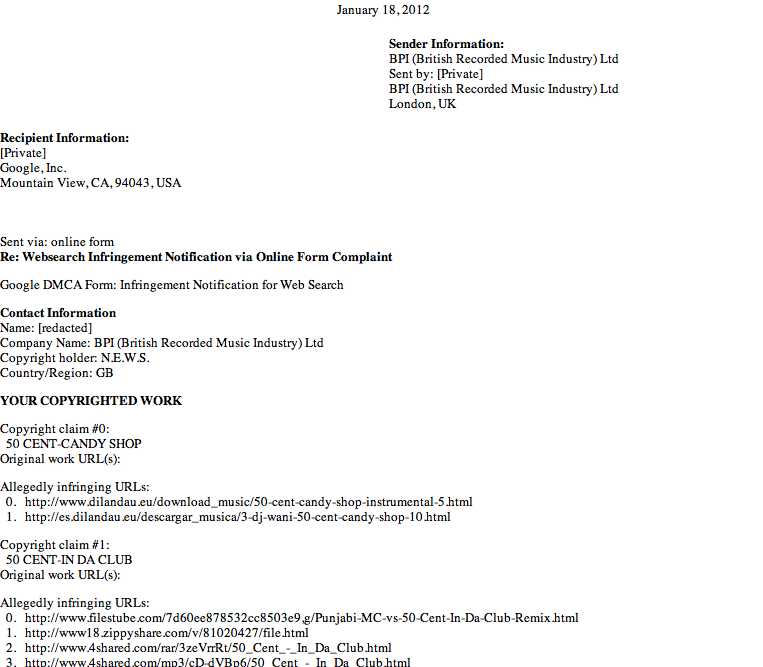
Hi David,
I am curious to your point of view about folks who have internet radio stations without any revenue stream; no ads, no subscriptions, just music…
Also, this is somewhat off topic but I’d like your opinion on this matter. I own a small bar and am constantly harassed by ASCAP and BMI for money for playing music in my bar. The ironic thing is that I am also a BMI songwriter. However, I feel that I am doing as much for the artist as the artist is doing for me. After all, I am exposing the public to music they might not know by playing that artist’s music. So, I think of it as a ‘wash’ in that I profit by playing music and the artist profits from the exposure I provide in my bar.
Last, I am a good friend with John Ashton from the Psychedelic Furs and he is very much interested in your articles. You can reach John at his FB page https://www.facebook.com/profile.php?id=1702578103
Please friend him as he is following your work closely.
Best wishes,
Rob Sacher
http://wakeme.net
Rob, I gotta respectfully disagree with you there. Artists almost never profit from simple “exposure”. It’s a ridiculous statement I’ve heard time and again in my career as a designer/illustrator, usually when someone doesn’t have the money, or simply doesn’t want to pay fair market value for my services. So instead they dangle the “exposure” carrot, thinking that they are actually doing me a great service. I’m sorry but I have a mortgage and a family, and I need to be PAID. Maybe the music world is a bit different, but I suspect many musicians would feel the same way.